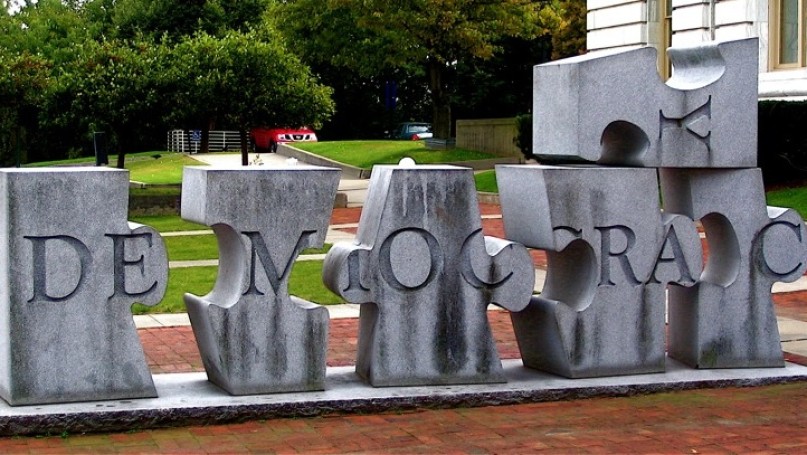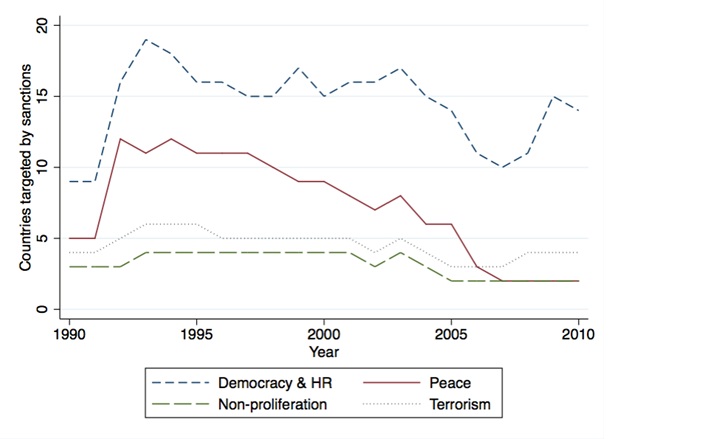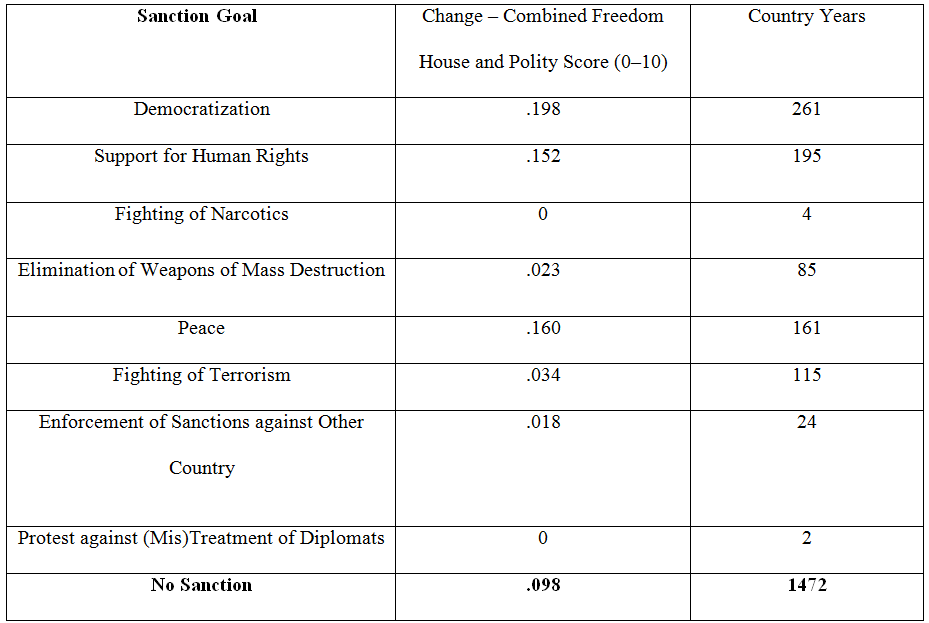
Democratic sanctions have a bad reputation. For most people with even a slight interest in international politics, it is not particularly hard to find examples to support a generally sceptic view of sanctions as a tool for external democracy promotion. The authoritarian regime in Zimbabwe has been targeted by both EU and US sanctions since 2002, but the Mugabe regime has remained stable and maintained remarkably high levels of repression, showing no real signs of political liberalization. Similarly, the EU’s sanctions against its Eastern authoritarian neighbour, Belarus, have still not had any noticeable effects. Despite costly sanctions in place since 2004, President Lukashenko remains one of the last European dictators.
And there is more bad news. Academic research has shown that sanctions are not only ineffective, but even counterproductive. It has been argued that authoritarian countries do not become more, but less democratic when targeted by sanctions (Peksen & Drury 2010; Wood 2008). In a recently published article in the journal Democratization, we reinvestigate the effect of democratic sanctions, i.e. those which explicitly aim at improving the level of democracy, using new data and statistical analysis, to see if democratic sanctions really are as bad as their reputation. Perhaps surprisingly, our findings are rather optimistic. Our study shows that sanctions are not always effective, sometimes they may even be counterproductive, and all types of sanctions are not equally likely to lead to positive outcomes, but on average, democratic sanctions are, in fact, associated with higher levels of democracy in the targeted state. We also show that democratic sanctions have other more profound effects on the targeted state. In authoritarian states targeted by democratic sanctions, authoritarian leaders are more likely to lose power and countries are more likely to change their basic political institutions. Such institutional changes do not necessarily lead to a fully-fledged liberal democracy, but often open up to increased civilian political control or multiparty elections.
Sanctions and Their Effect on Democratization
Instigating democratization has been by far the most common goal of sanctions initiated by the United States, the European Union, and the United Nations against authoritarian regimes in the post-Cold War period. Given previous research on the democratic effects of sanctions, the frequent use of sanctions as a tool for democratization is rather surprising (Drury 1998; Haass 1998; Pape 1997).

Number of international sanctions according to sanction goals. Source: Representation based on own data set.
In a seminal and widely cited study, Peksen and Drury (2010) argued that sanctions have an adverse effect on the level of democracy in targeted countries. According to the logic presented by Peksen and Drury, the negative democratic effect of sanctions is a consequence of increased levels of repression used by political elites in targeted countries as they attempt to cope with increased domestic pressure (also Wood 2008). Indeed, severe and widespread repression has often followed international sanction as a means to fight off increased opposition. However, previous research in the comparative democratization literature have shown that economic stress is one of the most robust determinants of democratization and/or regime change in authoritarian regimes (e.g. Geddes 1999; Bueno de Mesquita & Smith 2010; Teorell 2010).
Authoritarian regimes tend to survive with a mixed strategy of repression and co-optation (Rotberg 2007; Wintrobe 1998). Without the financial ability to co-opt counter elites, authoritarian regimes often resort to a strategy of increased repression. However, repression is generally a less efficient tool for long-term regime survival than co-optation (Bueno de Mesquita & Smith 2010; Gandhi & Przeworski 2007). Although often temporarily effective, repression is an imprecise instrument that often leads to an increase in both opposition support and levels of dissent (Lichbach 1987). As a consequence, economic downturn often results in regime accommodation or, even more dramatically, regime collapse. Sanctions can, if effectively designed and strategically imposed, be used to increase such economic pressure on authoritarian elites. Moreover, by targeting central elite figures or strategically important industries, sanctions can also effectively undermine the inner elite’s support for top-leaders or current institutions.
Although the current literature on comparative democratization makes it plausible that sanctions could have a positive effect on the level of democracy in the targeted country, this is not to say that all sanctions necessarily have the same effect. As several authors have acknowledged (Kirshner 1997; Allen 2005; Hufbauer et al. 2007), senders have used a multitude of sanction designs to achieve their desired goals. It is also not at all evident that sanctions aimed at goals other than democratization would have the unexpected and in some cases even undesired effect of causing regime change. For instance, we cannot expect sanctions aimed at ending nuclear weapon proliferation to have the same democratic effect as a sanction purposefully designed to instigate democratic reforms, such as introduction of multiparty elections or reinstatement of an elected civilian leadership. In earlier research on sanctions and democratization, sanctions have not been clearly separated in relation to their explicit goal. Thereby, the question of democratic sanction effectiveness has been left largely unanswered. In our study on sanctions and democratization, we are therefore especially interested in the democratic effect of those sanctions that explicitly aim to increase the level of democracy in the targeted country.
A New Data Set on Sanctions
We introduce a new data set of EU, UN, and US sanctions against authoritarian regimes in the period 1990-2010 and combine these data with standard indices of democracy to reinvestigate the effects of democratic sanctions. The new dataset is a vital asset to explore our research question and, in contrast to previous datasets on international sanctions, it clearly separates democratic sanctions from sanctions set out to achieve other objectives (Table 1).
Our data set is composed of the entire universe of sanction regimes imposed by the UN, the US, and the EU (the main sanction senders) in the period 1990-2010, including those sanction regimes that were already in place in 1990 and those episodes that are still ongoing (Portela & von Soest 2012). Given that the investigation explores the impact of sanctions on authoritarian regimes, the data set only includes countries that the Hadenius, Teorell, and Wahman data set (2013) has coded as being “nondemocratic regimes” at the start of the sanction episode.
Democratic Sanctions May Actually Help to Democratize
The article presents a number of statistical models to investigate the general democratic effects of sanctions. Table 2 shows a simplified presentation of the results by providing the average yearly change in democracy scores in countries targeted by different types of sanctions. The democracy index ranges between 0-10, where higher scores represent higher levels of democracy. Looking at all the different categories of sanctions presented in Table 1, our statistical analyses indicate that none of the imposed sanctions have been counterproductive to the democratic development of authoritarian regimes. Sanctions in general do not promote democratization, but democratic sanctions are significantly associated with higher levels of democracy in the targeted country. Our results are remarkable given that Peksen and Drury (2010) have shown that all sanctions have a robust negative impact on democracy. These findings show the importance of separating sanctions according to their explicit goal. When we look specifically at democratic sanctions, we observe much clearer positive outcomes than for all international sanctions combined. A potential problem with the results could be that democratic sanctions are generally more comprehensive than sanctions imposed to obtain other goals. Yet the variable remains significant when we control for these different measures.

Table 2: Mean yearly change in democracy scores according to different sanction goals. Note: Sanctions are lagged one year.
To study the more profound effects of democratic sanctions, we also tested whether democratic sanctions are associated with a higher rate of regime change and ruler exit. This provides an insight into how implemented democratic sanctions actually work in targeted authoritarian regimes and how they contribute to improved democracy levels. There is no general relationship between sanctions and a higher probability of rulers losing power. However, looking at only democratic sanctions, we see a significant positive relationship. It reaffirms Marinov’s (2005) finding that sanctions generally increase the probability of leadership exit. Such leadership exits can be an effect of leaders losing elections, being violently disposed from power or forced to resign.
A brief glimpse at some sanction cases reveals that different mechanisms may account for increased democracy levels in targeted authoritarian regimes, with the two major ones being (1) elite splits (and, in turn, regime changes and leadership exit) and (2) democratic concessions without regime and/or leader change. In Guatemala (1993), for instance, the military ousted President Serrano – who had unconstitutionally dissolved parliament and the judiciary – after the US and its allies imposed sanctions. An interim president took over, and the country’s democratic institutions were restored. In Nicaragua (1996) and Thailand (1993), sanctions similarly contributed to regime change.
However, democratic sanctions rarely manage to instantly create liberal democracies. More commonly, we see a regime trajectory where closed authoritarian regimes are replaced by some form of electoral authoritarianism. Although such transitions do not amount to a fully-fledged transition to democracy, they increase competition and increases prospects for future democratisation (Teorell 2010).
In Peru, sanctions contributed to democratization without ruler change. When President Fujimori suspended the legislature and introduced rule by decree in 1992, the US withheld military assistance and economic aid and blocked Peru’s efforts to obtain loans from international financial institutions. In response, Fujimori agreed to hold elections and to reinstate formally democratic institutions. Although his presidential dominance persisted until 2000, Peru’s political system was liberalized, to some extent, for the remainder of his time in office (Collins 2009, pp.80-81). In this particular case we could, hence, observe both institutional change and democratization, without change in leadership.
Conclusions
Since the end of the Cold War, democratization has motivated an overwhelming majority of sanctions directed towards authoritarian regimes. Previous literature gives little support for continuing the practice of sanctioning authoritarian regimes, especially if the aim is to induce democratization. It is suggested that sanctions are not only generally ineffective, but also counterproductive in increasing the level of democracy in the targeted countries.
In our recently published study, we provide evidence to the contrary. We argue that empirical research on the effectiveness of sanction must take the explicit goal of sanctions into account. By concentrating only on sanctions aimed at increasing the level of democracy in the targeted authoritarian state, we found that these sanctions are indeed associated with increasing levels of democracy. Moreover, authoritarian regimes targeted by democratic sanctions are more likely to experience institutional and leadership change.
These findings should not be taken as evidence to justify all types of sanctions in all contexts where democracy is on the decline. There are several examples of highly unsuccessful democratic sanctions in the past and we can be sure to see many more such examples in the future. However, the findings work to rebut earlier academic research on the ineffectiveness of democratic sanctions and offer a more nuanced picture of sanctions as a tool for promoting democracy abroad.
The full analysis can be accessed here: “Sanctions and Democratization in the Post-Cold War Era,” Democratization, 2014 (online first).
References
Allen, S.H., 2005. The Determinants of Economic Sanctions Success and Failure. International Interactions, 31(2), pp.117–138.
Bueno de Mesquita, B. & Smith, A., 2010. Leader Survival, Revolutions, and the Nature of Government Finance. American Journal of Political Science, 54(4), pp.936–950.
Collins, S.D., 2009. Democracy Sanctions: An Assessment of Economic Sanctions as an Instrument of Democracy Promotion. Taiwan Journal of Democracy, 5(2), pp.69–96.
Drury, A.C., 1998. Revisiting Economic Sanctions Reconsidered. Journal of Peace Research, 35(4), pp.497 –509.
Gandhi, J. & Przeworski, A., 2007. Authoritarian Institutions and the Survival of Autocrats. Comparative Political Studies, 40(11), pp.1279–1301.
Geddes, B., 1999. What Do We Know about Democratization after Twenty Years? Annual Review of Political Science, 2, pp.115–144.
Haass, R.N., 1998. Economic Sanctions and American Diplomacy, New York, NY: Council on Foreign Relations Press.
Hufbauer, G.C. et al., 2007. Economic Sanctions Reconsidered, Washington, DC: Peterson Institute of International Economics.
Kirshner, J., 1997. The Microfoundations of Economic Sanctions. Security Studies, 6(3), pp.32–60.
Lichbach, M.I., 1987. Deterrence or Escalation? The Puzzle of Aggregate Studies of Repression and Dissent. Journal of Conflict Resolution, 31(2), pp.266–297.
Marinov, N., 2005. Do Economic Sanctions Destabilize Country Leaders? American Journal of Political Science, 49(3), pp.564–576.
Pape, R.A., 1997. Why Economic Sanctions Do Not Work. International Security, 22(2), pp.90–136.
Peksen, D. & Drury, A.C., 2010. Coercive or Corrosive: The Negative Impact of Economic Sanctions on Democracy. International Interactions, 36(3), pp.240–264.
Portela, C. & von Soest, C., 2012. GIGA Sanctions Dataset Codebook. Version 18 June 2012, Hamburg: GIGA German Institute of Global and Area Studies.
Rotberg, R.I., 2007. Repressive, Aggressive, and Rogue Nation-States: How Odious, How Dangerous? In R. I. Rotberg, ed. Worst of the Worst. Dealing with Repressive and Rogue Nations. Cambridge, MA: World Peace Foundation, pp. 1–39.
Teorell, J., 2010. Determinants of Democratization: Explaining Regime Change in the World, 1972-2006, Cambridge University Press.
Wahman, M., Teorell, J. & Hadenius, A., 2013. Authoritarian Regime Types Revisited: Updated Data in Comparative Perspective. Contemporary Politics, 19(1), pp.19–34.
Wintrobe, R., 1998. The Political Economy of Dictatorship, Cambridge University Press.
Wood, R.M., 2008. “‘A Hand upon the Throat of the Nation’”: Economic Sanctions and State Repression, 1976–2001. International Studies Quarterly, 52, pp.489–513.
Further Reading on E-International Relations
- Sanctions as Violence
- Opinion – Deciphering China’s Uncomfortable Sanctions Discourses
- Can Zimbabwe Move Beyond the Sanctions Rhetoric?
- US Sanctions against Iran and Their Implications for the Indo-Pacific
- The Changing Geopolitical Context of US Support for Human Rights and Democracy Promotion
- How Racial Injustice Undermines Democracy Promotion
